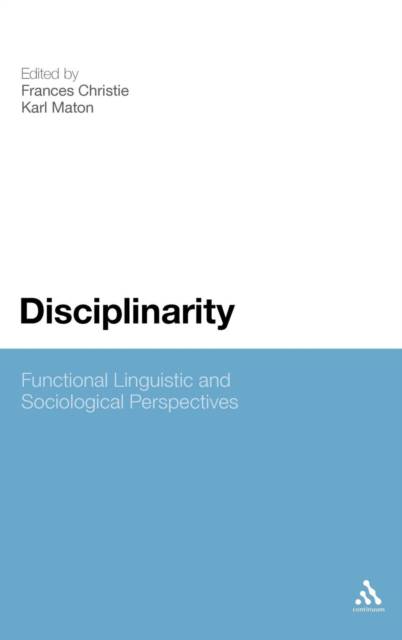
Bedankt voor het vertrouwen het afgelopen jaar! Om jou te bedanken bieden we GRATIS verzending (in België) aan op alles gedurende de hele maand januari.
- Afhalen na 1 uur in een winkel met voorraad
- In januari gratis thuislevering in België
- Ruim aanbod met 7 miljoen producten
Bedankt voor het vertrouwen het afgelopen jaar! Om jou te bedanken bieden we GRATIS verzending (in België) aan op alles gedurende de hele maand januari.
- Afhalen na 1 uur in een winkel met voorraad
- In januari gratis thuislevering in België
- Ruim aanbod met 7 miljoen producten
Zoeken
Disciplinarity
Functional Linguistic and Sociological Perspectives
Frances Christie, Karl Maton
Hardcover | Engels
€ 390,45
+ 780 punten
Omschrijving
Disciplinary knowledge is under threat in the modern world. Claims abound that we are entering a landscape in which the division of disciplines is obsolete, implying a commitment to outdated values in scholarship. Notions of discipline are critiqued as reflecting social power and representing the worldview of dominant social groups. By addressing and challenging such claims, this edited collection argues that proclamations of the death of disciplines have been greatly overstated. Not only are the notions of disciplinarity still important for understanding how we come to know the world, but this volume demonstrates how significant disciplinarity is to understanding different forms of knowledge if we wish to improve the building of knowledge and educational practice. Using analytical tools from systemic functional linguistics theory and social realist sociology, this volume illustrates how different disciplines can collaborate and cross-fertilize successfully, without losing their distinctive insights and disciplinary integrity. The subsequent theory developed will thereby extend both linguistic and sociological approaches to the topic and make a major contribution to educational theory.
Specificaties
Betrokkenen
- Auteur(s):
- Uitgeverij:
Inhoud
- Aantal bladzijden:
- 272
- Taal:
- Engels
Eigenschappen
- Productcode (EAN):
- 9781441131805
- Verschijningsdatum:
- 7/04/2011
- Uitvoering:
- Hardcover
- Formaat:
- Genaaid
- Afmetingen:
- 156 mm x 234 mm
- Gewicht:
- 557 g

Alleen bij Standaard Boekhandel
+ 780 punten op je klantenkaart van Standaard Boekhandel
Beoordelingen
We publiceren alleen reviews die voldoen aan de voorwaarden voor reviews. Bekijk onze voorwaarden voor reviews.









